When discussing how to survive economic collapse and live without money, most people just talk about things like “stockpile barter items” or “learn how to make something you can trade.”
This is NOT going to be one of those articles!
I’ve spent a lot of time thinking about and researching how to live without money. Most of the info on the subject comes from anarchists and anti-capitalists. Even if you disagree with their politics, they have some good ideas.
In this post, I will get into the nitty-gritty details about what happens during an economic collapse, moneyless economies, and how those principles can be applied to a post-collapse society.
I encourage you to read this entire article. But, if you are pressed for time, skip to the step-by-step instructions for living without money.
Table Of Contents
What Happens During an Economic Collapse?
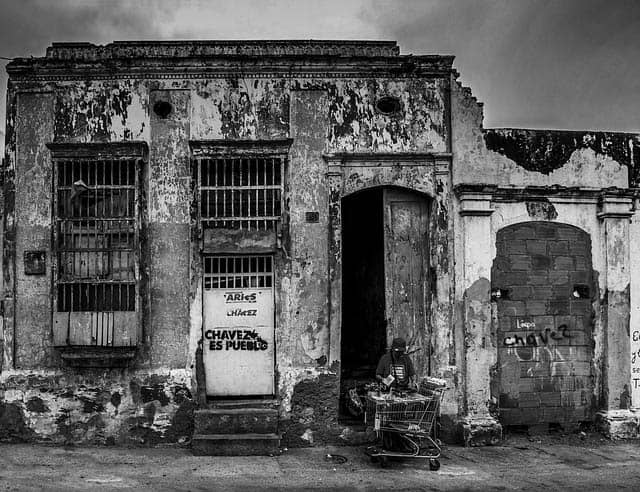
A global economic collapse has never happened. However, many countries have experienced economic collapse.
Specifically, Yugoslavia was in the 1990s, Zimbabwe in the 2000s, and Venezuela. We can learn a lot from what happened to them.
Hyperinflation
Inflation of around 2-15% is expected in an economy. (1) During economic collapse, though, the inflation skyrockets. In Zimbabwe, for example, the inflation reached 500 billion percent!
What causes hyperinflation?
It is an entirely manmade disaster. (2) It almost always starts with the government printing extra money to make up for some pitfall (such as lowered oil prices in Venezuela’s case).
This creates a chain reaction. Since people perceive money as worthless, they start to demand payment in other currencies (in Zimbabwe and Venezuela, people switched to dollars; in Yugoslavia, it was German marks).
The government makes the situation worse by printing even more money. The inflation gets worse. Soon, you see notes like the 500 billion dinar note in Yugoslavia. In 1993, that would buy you two liters of milk. (3) People would get their paychecks and run to the money changers because, in an hour, the currency could lose even more value.
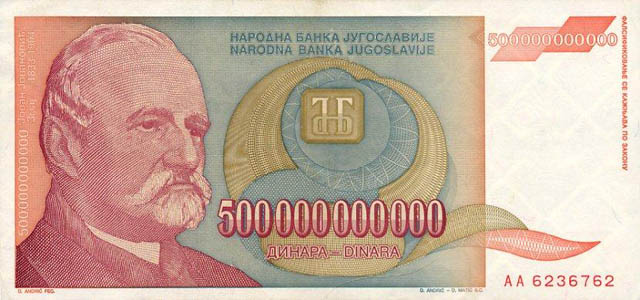
Shortages
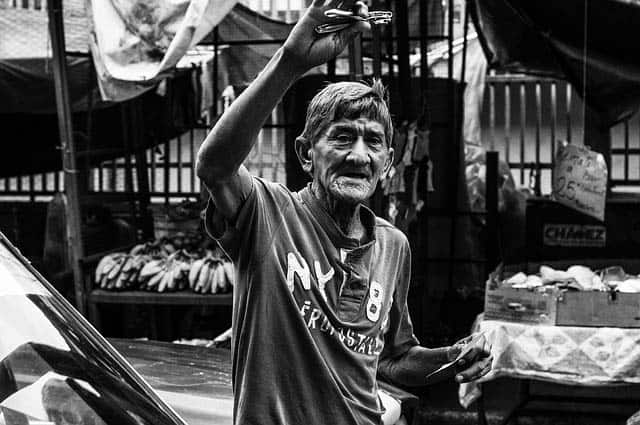
As the currency loses value, people start to hoard valuable items. Supply/demand causes the prices to skyrocket. Soon, something like a bag of sugar might cost an entire month’s paycheck.
The government tries to stop hyperinflation by implementing price controls. Suddenly, you’ve got long lines at stores to buy whatever items are still affordable.
Since the store isn’t making any money (and any money they make becomes worthless), they stop investing and selling. Soon, you can’t find anything in the stores. (4)
Since you can’t buy anything in stores, an alternative economy – the black market – fills the void. In black markets, you’d find people selling price-controlled items from the store at a considerable markup.
It’s worth noting that some people become rich during economic crises. In Yugoslavia, for example, people who lived near the border could smuggle items into the country and sell them for a huge profit.
Other people get lucky because of hyperinflation. For example, a Serbian friend of mine’s parents took out a mortgage to build a house right before the inflation started. What started as a huge mortgage was paid off for the equivalent of three dollars. Not that they enjoyed the economic crisis, but they got a free house because of it.
Starvation, Looting, and Rioting
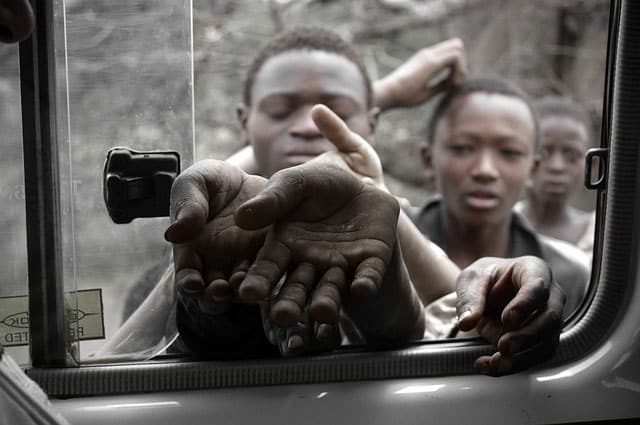
Without food on the shelves, a lot of people end up starving. In Zimbabwe, protests turned into riots. In Venezuela now, hungry mobs loot and fight for whatever food is available.
It isn’t always the case, though. In Yugoslavia, no one starved. The country was agricultural, and the crops were plentiful. People who lived in the city usually had relatives living in the country who would send them food. (5)
What about other supplies? As one Venezuelan points out, people get creative. “You’d be surprised how many things you can do with a coat hanger.”
If You Want to Survive, Give Up on Money
As pointed out in the Washington Post, money no longer works under hyperinflation:
“(Money) stops being something you want to have and turns into something you’ll do anything to avoid having: something so worthless you won’t even bend down and scoop it up off the floor while you’re looting.”
To survive an economic collapse, you’ll need to give up on money altogether.
No Job = More Money
During economic crises, many people continue to work their jobs even though their paychecks are virtually worthless. This might be smart for short-term financial crises because you’d have a career after the crisis ended.
However, in a major economic collapse, you’d be better off quitting your job. One Venezuelan said, “You’d be stupid to go to work.”
As homesteaders will tell you, you can have more money by not working.
To work, you need money for:
- Gas for your car
- Vehicle maintenance
- Clothes to wear at the job
- Takeout meals since you don’t have time to cook
- Gear like a laptop and briefcase
Without these work-related expenses, you suddenly have much more money freed up. Since you aren’t working, you will have more time to work on self-sufficient projects like growing your own food. This further reduces your need for money.
What about Gold and Silver?
This is a touchy subject in the prepper community since so many think buying gold is an excellent way to prepare for economic collapse.
Gold only has value since we perceive it to be valuable. Some people will likely still consider gold valuable after an economic collapse. However, you can’t eat gold, and gold has no immediate value.
Things like food and medicine will have much more immediate value than gold.
That doesn’t mean you shouldn’t buy gold and silver. Having gold/silver is one way to diversify your assets. Likewise, you might want to invest in currencies like Euros and Yen. If the American dollar collapses, you’ll still have currencies with value.
Of course, this is contingent on only one currency collapsing. If the global economy collapses, all money – including gold and silver – will be worthless.
Utilizing the Black Market
When a country’s economy collapses, a black market always springs up. The black market replaces the regular economy. Without it, many more people would end up starving.
It might make sense to utilize the black market to survive economic collapse. You could even make a lot of money (in a currency that still has value) through the black market.
For example, in Venezuela, the situation is so bad that people are selling single squirts of toothpaste since no one can afford an entire tube. If you have toothpaste stockpiled, you could get rich.
But black markets come with a lot of risks.
Do you want to risk someone following you home because they’ve seen you at the black market selling goods every day? Next thing you know, your home is looted, and you have nothing left.
Thus, I still argue that you should give up on money completely during an economic collapse. It isn’t a bad idea to stockpile barter items in case you run out of crucial items and need to use the black market. However, you are safer avoiding the black market altogether.
How People Lived without Money in the Past
When we picture life before money, we usually imagine it like this:
You knew how to make metal tools. So, you would go to your neighbor who foraged mushrooms. You would trade one of your metal knives for a bag of mushrooms.
This system is called the barter economy. It’s defined as,
A cashless economic system in which services and goods are traded at negotiated rates.
As many people have pointed out, barter economies are very impractical.
What if your neighbors didn’t need any metal tools? Or what if you wanted medicine and not mushrooms? You’d have to take those mushrooms and keep trading them until you got what you needed.
Supposedly, that’s why people invented money – it was a lot easier to take money instead of trading.
The Myth of Barter Economies

But this idea of life before money we have is a myth. According to researchers, there are NO examples of barter economies in history (which makes sense since barter economies would be so impractical).
The philosopher Adam Smith claimed that barter economies were what people used before money was invented.
In reality, barter economies emerged from money economies. For example, when someone didn’t have money, they would use barter instead. The bartered items would probably end up getting sold for cash. (6)
While stockpiling barter items in case of economic collapse is still a good idea, you don’t want to rely on this. Black markets are dangerous. And, since black markets rely on money-based economies, they are even more hazardous in a global economic collapse.
If they didn’t barter, then what did people use before money? It’s called the gift economy.
Gift Economy
A gift economy is defined as:
“A mode of exchange where valuables are not traded or sold, but rather given without an explicit agreement for immediate or future rewards. This contrasts with a barter economy or a market economy, where goods and services are primarily exchanged for value received.”
I’ve got to admit that the first time I heard the term gift economy, I laughed. Who is going to give away something for free?
But the more you think about it, the more sense it makes.
Imagine a small farming community. Families would provide for most of their own needs (self-sufficiency). Each family would also specialize in a trade, such as medicine or barn-building. If a person needed medical help, the doctor would come over for free. If someone needed a barn built, the expert would come help.
It wasn’t a direct exchange of goods and services. The barn-builder didn’t have to wait for the doctor to need a barn before asking for medical help. Someone was always helping someone else without expecting immediate payment, and the exchange of gifts eventually balanced out. (7)
If you are struggling with the idea of a gift economy, just substitute in different terminology. For example, the “prepper communities” that survivalists talk about – where everyone has a job to contribute – are gift economies.
Self-Sufficiency Is an Illusion
From the prepper community (as well as survivalists and homesteaders), you’ll see the term “self-sufficient” thrown around a lot.
I fully support moving towards self-sufficiency. But true self-sufficiency is impossible.
All living beings rely on others for survival. As bees rely on plants for nectar (which depend on sunlight, worms to add nutrients to the dirt, etc.), people rely on others to meet their basic needs.
You will never know how to do everything needed to survive. Even growing your own food is a challenging project to embark on alone. What about chopping firewood, cooking, making clothes, and keeping yourself emotionally and spiritually healthy?
The irony is that our current money-based economies are very impersonal.
They also make us very dependent. Mark Boyle (who spent a year living without money) discusses this in The Moneyless Manifesto. (Amazon link)
I’ve summarized it below.
A money-based economy (what most of us live in)
People generally just know how to do one thing (their “job”).
No one does anything for free.
There is no sense of community.
The mentality is “every man for himself.”
Barter economies (such as black markets)
People are still reliant upon money for most of their needs.
Bartering allows for some independence from the monetary system.
People must expand their skills beyond their job, such as by learning how to make soap or canning veggies, to have something to offer in the economy.
Gift economies
Are locally-based
There is a strong sense of community.
People are reliant on each other and readily help one another.
Everyone has many skills and aims to be as self-sufficient as possible.
Requirements of a Gift Economy
While it might seem impossible in today’s world, a gift economy can work. We can see this in small communities and families where people work together, each with their own job. However, the success is contingent on these aspects:
1) Everyone is productive.
As Jessika Toothman writes,
“For a gift economy to work, everyone would have to continuously focus on being as productive as possible. Things wouldn’t work if certain folks did nothing or waited for a handout., if you possessed or produced something you didn’t need, you’d give it to someone who did without complaint.”
Even children, older people, and disabled people can contribute. It may be as simple as cleaning up trash or weeding gardens, but everyone must have a role.
2) People only take what they need.
One of the problems with money-based economies is that people take much more than they need. This creates an imbalance in resources.
In a gift economy, though, people only take what they need (notice it is need and not want).
Even nature works on this principle. Ever seen a video of a lion killing a zebra? The zebras run like crazy until one of them gets killed. Then they stop running. A lion can eat the killed zebra right next to the other zebras. The zebras aren’t scared anymore because they know that the lion isn’t going to keep hunting. The lion only kills what it needs because the “economy” would crash if the lion kept killing the zebras.
3) Locally-based.
Another critical aspect of gift economies is that they are local. You can’t have someone across the country involved, as the gifts will be too difficult to balance out.
4) No waste.
If people are being wasteful, keeping productivity levels high enough to meet everyone’s needs will be challenging.
Americans are notoriously bad about wasting: as much as 40% of food ends up in landfills. (8) Trust me, if you are growing your own food, you will appreciate it a lot more and can it/pickle it/cook it before it goes bad.
This goes back to what I said about no job = more money. If you spend time on projects like growing your food, you are less likely to waste and thus spend even less money.
Recommended Reading: How To Preserve Food
Living without Money Today
Lots of people have undergone experiments in living without money.
- Mark Boyle founded the Freeconomy Community in 2007. Later, he decided to spend a year entirely without money.
- Carolien Hoogland also spent a year without money as a personal experiment.
- Until she died in 1981, Peace Pilgrim lived without money for 28 years while walking across the USA.
During college, I spent a lot of time with anarchist/punk types who lived almost without money. They’d squat in abandoned buildings and dumpster dive for food. My friend Michelle had the most amazing pants, which were basically just patches because they’d been stitched up so many times.
However, these people all relied upon others who used money.
Or, as is the case with my anarchist friends, they relied on a functioning money-based system (you can’t dumpster dive food if there aren’t any supermarkets!). Thus, it was not truly a moneyless system.
The closest example (that I know of) of truly moneyless living is Daniel Suelo, who blogs at Zero Currency. He rejected not only money but also bartering. He could do it by living off the land and sleeping in caves. His life is documented in the book The Man Who Quit Money.
Most people wouldn’t fare well with this extreme approach. Even if they knew how to live off the land, they’d be in trouble if they got seriously sick or injured.
You don’t have to be into living off the land or dumpster diving to move closer towards moneyless living. Time banks is a great place to start.
Time Banks
One of the cool things about the global world we are living in is that it makes it easier to live without money.
For example, in Detroit (where many people are without money due to unemployment) time banks are popular. A time bank is a system where hours are the currency. Someone can earn an hour by babysitting. This hour can then be redeemed later for services such as car repair. You can also work for food. (9)
These aren’t entirely moneyless systems (you can’t pay your bills with a time bank). And there’s no telling how these systems would hold up during economic collapse (probably not very well). However, it is still worth trying them out. You might find it a great way to connect to your local community.
Surviving Economic Collapse
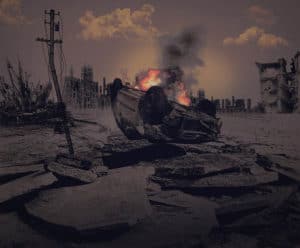
We’ve established that money becomes worthless during an economic collapse. Instead, hard currency reigns supreme.
During a localized economic collapse, people will probably switch to another currency (such as how Venezuelans use dollars). During a global economic collapse, the hard currency will be food, matches, and fuel.
We’d go from a money-based economy to a barter economy. That leads to black markets and situations where you’ve got 100 tubes of toothpaste but nothing to eat.
The following steps break down how you could survive an economic collapse. Do the first step, and you will get by. The more steps you complete, the more likely you will survive well.
Step 1: Stockpile Emergency Supplies
These supplies will serve as a hedge in case you need to “hunker down” in the immediate aftermath of a disaster. This way you won’t need to buy anything. It’s not exactly living without money since you purchased all the supplies with money, but it saves you from having to worry about money while the world dissolves into chaos around you.
Ideally, you should have at least 3 months of emergency supplies. Start small and gradually work your way up to 3 months.
If you must flee your home, you should also have a secure “bug out location” with emergency supplies.
Here are guides on what to do to be prepared.
- Emergency water storage options
- Emergency food
- Long-term food storage
- Emergency medical supplies checklist
- List of barter items to stockpile
- How to choose a bug out location
Step 2: Learn to Make a Barter Item
In every example of economic collapse, black markets take over. Instead of just stockpiling barter items (which would eventually run out), you could learn to make a barter item. That way, you always have something to offer on the black market.
Some ideas of barter items you can make are:
Step 3: Know How to Survive in the Wild
If you had to flee into the wilderness after an economic collapse, you would need to provide for your basic needs (shelter, water, food, warmth).
This is the purest way to live without money in a post-collapse world. However, living in the wild isn’t going to be very comfortable. And survival isn’t guaranteed. What if you were to get injured or sick? Wild medicinal plants can only take you so far! Thus, you’ll want to move towards steps 4 and 5 for long-term survival after economic collapse.
Read:
- How to find water in the wild
- Wilderness shelters
- How to make a fire without matches
- Wilderness food
- Cold Weather Survival
- Medicinal plants found in the wild
Step 4: Increase Self-Sufficiency
You won’t need to use money or even the black market if you can provide for most of your needs. You could leave the post-collapse chaos and go live off the land.
Many homesteaders live almost without money by growing their own food and making the most of their products. Even if disaster never strikes, there are many benefits to becoming more self-sufficient, like saving you money and restoring your connection with the land.
Read:
- Getting started with self-sufficient living
- Growing your own food
- How much land do you need to be self-sufficient?
- Homestead layout plans on 1 acre or less
- Checklist for going off-grid
Step 5: Build a survival community
No one can be 100% self-sufficient. Even if you are a bushcraft master and can live in the wild, you still risk getting injured or sick. That’s why you should have a survival community.
Some take the extreme step of moving to a “prepper community” in a remote location. But you don’t necessarily have to uproot your life to build a survival community.
For a survival community to work, all members must have something that they can contribute. Some valuable survival skills to learn include:
- Agriculture
- Hunting
- Foraging
- Raising animals for food
- Medicine and first aid
- Mechanics
- Construction
- Defense/security
- Alternative energy
- Sewing/making clothes
- Blacksmithing
If you can create a survival community that works on the “gift economy” principles discussed earlier, you can truly live without money.
Read this article on how to build a survival community. It will guide you on how to get started so you don’t just survive after a disaster but thrive.
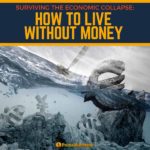


The gift economy sounds vaguely socialist/communist…from each according to his ability, to each according to his need. Never works long term or to scale but maybe with a smaller group of people…like a commune….like a cult.
Socialism, democracy, absolute ruler… All of these systems fail in some ways on a large scale. I actually know of a lot of small communities which are basically mini socialist societies and they work amazingly well (not all communes are cults!). But they don’t have more than a hundred or so people so issues can be worked out quickly.
Dr. Christopher Ryan covered this in his book “Civilized To Death”. He talked extensively about the hunter-gatherer egalitarian society. I think what you’re describing is egalitarianism, not socialism or communism. A very good article Ms. Vuković; I found you through David DuByne at Adapt 2030. He referenced you in his latest video (7/21/22). Guns and ammo are good to have, but I think the Big H’s — Hunger and Hygiene — are going to be the real killers. Stay safe and I will see you on the other side.
Thanks for the comment. I agree with DuByne — especially about the hygiene. Everyone wants to talk about “sexy” prepping topics like knives and ammo, but no one wants to talk about emergency toilets. It only takes a small flood to have a literal SHTF situation!!!
Oddly I can do 80% of that list and more not mentioned. BUT, you have to defend to to keep just that little. A warrior first. Survive the plagues and brutality……
yes my first thought also…..
I wonder if anybody has ever sat down and figured out how many people would be needed for each category (understanding that some do double duty) for a long-term, self-sufficient community?
E.G.:
Clothes: Cotton carder, thread spinner, cloth weaver, seamstress, etc.
Food: Baker, meat cutter/cook, vegetable gatherer/preparer, etc.
Hunters: Squirrels, rabbits, deer, hogs, etc.
Cobblers: shoes, belts, pouches, etc.
Water: gathering, purifying, storing, distributing, etc.
Carpenters: Homes, tool handles, benches, chairs, beds,
Armorer
Ammunition Reloader
Doctors
Nurses
Bee Keepers
Animal Husbandry
Firewood/lumber
Farmers
Gardeners
Glass blowers
Security Force
Distillers
Arborists
Tree experts
Naturopath
Fishermen
Machinists
Small Engine Repair
Ice House Keeper
etc.
And how many animals:
Cattle
Horses
Sheep
Pigs
Rabbits
Chickens/Ducks
(Fish?)
That isn’t exhaustive by any means nor is all of it necessary but figuring out how to do one to three of those jobs and acquiring the tools and supplies and education to do them well would be important for any prepper list you might make.
I like the list you made, thanks. I am a woman and I figure I could do three. Let’s say I have sheep, which means a source of food and ability to sell meat once they reproduce plus I would be able to get wool, I would just need to shear them, have a cotton carder and a spinner, I could also weave the thread to make fabric, I could sew which means I could also be a cobbler. I’d be busy the entire day with all my projects. Wow, that sounds fun but unfortunately no interest from people in 2020 so I wouldn’t be able to survive on that. But it was nice imagining how I would contribute if we were trying to have a self-sufficient community 🙂
Have you ever done any of that? Each job you blithely listed off can take years to learn. Being a seamstress does NOT mean you would be a cobbler. I’m a leatherworker but my skills would be stretched to be a cobbler.
The gift economy is very “Pollyannaish” perhaps Your barn builder’s livestock keeps getting out and eating the Doctors vegetable garden, maybe the doctor isnt going to be so quick to ‘Gift’ the guy who keeps him from enjoying the results of his hard work.. Logic says, ‘why prolong my starvation’?
The barter system works even when personalities clash.. The doctor needs a barn, the barn builder needs a doctor. It behooves both partys to set their differences aside, for the sake of the trade.. It’s not what you know, it’s who you know that makes the barter system flourish.
History is full of examples of successful barter economies. It’s called trade..and it has been around long before one nation accepted another currency.
Writing this, I also realized that a gift economy can seem undoable (especially in today’s money-based world). However, if we are talking about completely living without money, history tells us that it is the only true way to live without money.
As mentioned (and referenced) in the article, money predates barter systems: Barter systems are based on money, with the idea that you’ll be able to get money for goods at some point.
In a true gift community, I’m sure communities would be able to take care of issues like one member’s livestock eating the doc’s vegetable garden. For example, a member could be expelled from the community if he/she didn’t pull fair weight or abide by certain rules. Thus, people wouldn’t look at sharing the fruits of their labor as “gifting” or “prolonging starvation” but rather “Look at how much more we can accomplish together!”
Again, I’m aware that this seems impossible in today’s money-driven, individualistic society. But there are some alternative communities which are already moving towards this system with success. However, it has to be VERY local to succeed – and too many of us are reliant on perks of the global economy, such as being able to eat whatever we want during any time of the year or buying cheap goods from around the world. It would take a HUGE adjustment to switch to gift economies/moneyless living.
Diane.
Most useful and balanced article on the subject I’ve ever found! Thank you.
Thanks Ashley we try to avoid the usual over sensationalism here.
Eu sempre tenho lido seus artigos, tudo muito bom, tudo muito bem escrito. Pratico muito do que leio aqui e em outros lugares (e do que aprendi por experiência própria em minha vida). Sou grato pelo que você escreve.